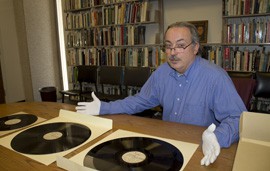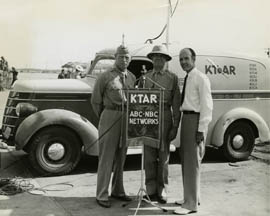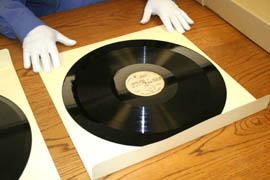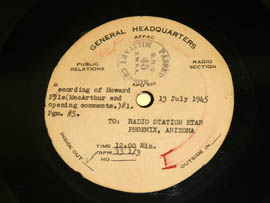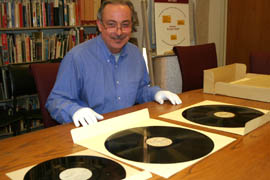Cronkite News has moved to a new home at cronkitenews.azpbs.org. Use this site to search archives from 2011 to May 2015. You can search the new site for current stories.
Restored recordings share greetings from Arizonans serving in World War II
TEMPE – “I’d like to send my love to my wife and son.”
“Until that day when I can come home to you … cheerio.”
“Hello, Mother and Dad, I hope you’re fine … I’m making it OK.”
These and other messages home to Arizona echo across the decades in recordings made during World War II by Howard Pyle, a war correspondent who later served as Arizona’s governor.
Until now they were on aging vinyl transcription discs and existed in obscurity as part of archives Pyle’s wife donated to Arizona State University in 1988.
But in time for Veterans Day, those and other recordings in the collection have been digitized and made available online by ASU Libraries staff, with funding from the Luhrs Family Endowment and ASU.
“I can’t sufficiently describe the excitement of this,” said Robert Spindler, archivist and curator for the Arizona Collection at ASU Libraries. “We spent several thousand dollars without really knowing what was in these discs in detail.”
Four recordings of J. Howard Pyle radio broadcasts interviews with Arizona soldiers who served in the Philippines in 1945. For full recordings visit Arizona State University digital repository collections
Before Pyle was governor from 1951-1955, he was a popular broadcaster on Phoenix radio station KFAD, which became KTAR. For 25 years, he broadcast an Easter sunrise service from the Grand Canyon that was carried nationally by NBC.
As a war correspondent, he recorded brief “Hometowner” interviews with Arizona soldiers and nurses in the Philippines. The collection available online contains the voices of 34 Arizonans serving during WWII.
“These materials have great emotional and personal value to families of the servicemen and -women that are represented here,” Spindler said.
Pyle broadcast a report of the Japanese surrender aboard the USS Missouri and was among the first radio journalists to enter conquered Japan.
The collection, 40 tracks in all, includes Pyle’s descriptions of flying into Yokohama, Japan, with the 11th Airborne Division and trying to get control of radio facilities from Japanese soldiers who hadn’t received order to turn them over.
“It’s those moments that you get just a brief glimpse of what Howard Pyle endured in trying to cover these very important events for the world,” Spindler said.
Research on the recordings led an ASU archivist to Margaret Ambos Sanderson, who was able to listen via computer to a fellow serviceman reading a message her father, Arnold M. “Fuzzy” Ambos, wrote a week before her birth.
“It said, ‘I have a message from Arnold, and it was to his parents and his wife, my mom, and it said that everything was fine and he loved them very much,” said Sanderson, who lives in Globe. “That gave me cold chills, I’ll tell ya.”
Her father went on to serve in Korea, where he earned the Purple Heart, then served 25-plus years as clerk of the Superior Court in Gila County.
Spindler said he hopes making the recordings available online helps identify more Arizona descendants of those featured.
“We think that some of those families may contact us as a result of making this public and add to our knowledge of these individuals’ contribution to the war effort,” he said.
Other recordings made available include Gen. Douglas MacArthur addressing the First Congress of the Philippines, Pyle’s interviews from the 1945 United Nations Conference on International Organization in San Francisco and a 1951 Grand Canyon Easter service when Pyle was governor.
Spindler said restoring the recordings and placing them in historical context has produced “jaw-dropping moments.”
“It’s one of the great things about archival work, it’s the process of discovering what’s really in this material,” he said.

